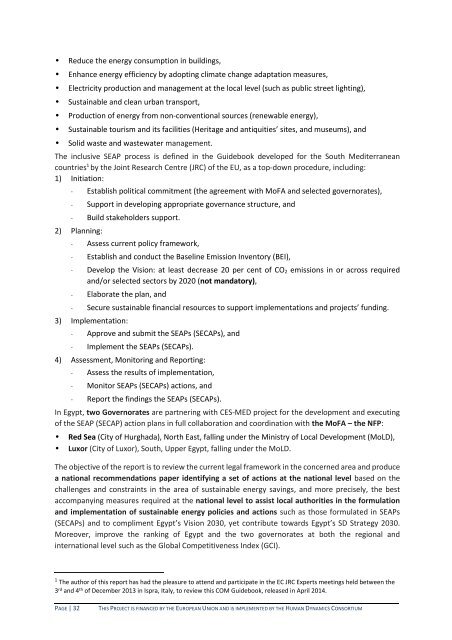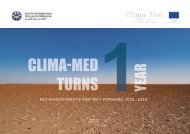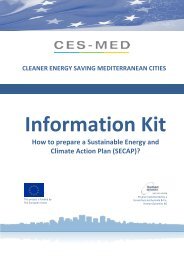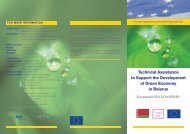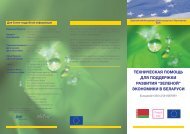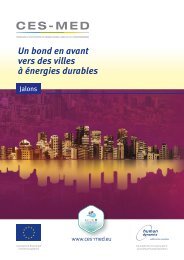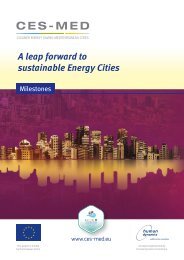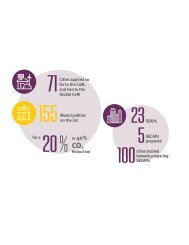180917_CES-MED_National_Report_Egypt_FINAL2rev
Create successful ePaper yourself
Turn your PDF publications into a flip-book with our unique Google optimized e-Paper software.
• Reduce the energy consumption in buildings,<br />
• Enhance energy efficiency by adopting climate change adaptation measures,<br />
• Electricity production and management at the local level (such as public street lighting),<br />
• Sustainable and clean urban transport,<br />
• Production of energy from non‐conventional sources (renewable energy),<br />
• Sustainable tourism and its facilities (Heritage and antiquities’ sites, and museums), and<br />
• Solid waste and wastewater management.<br />
The inclusive SEAP process is defined in the Guidebook developed for the South Mediterranean<br />
countries 1 by the Joint Research Centre (JRC) of the EU, as a top‐down procedure, including:<br />
1) Initiation:<br />
- Establish political commitment (the agreement with MoFA and selected governorates),<br />
- Support in developing appropriate governance structure, and<br />
- Build stakeholders support.<br />
2) Planning:<br />
- Assess current policy framework,<br />
- Establish and conduct the Baseline Emission Inventory (BEI),<br />
- Develop the Vision: at least decrease 20 per cent of CO 2 emissions in or across required<br />
and/or selected sectors by 2020 (not mandatory),<br />
- Elaborate the plan, and<br />
- Secure sustainable financial resources to support implementations and projects’ funding.<br />
3) Implementation:<br />
- Approve and submit the SEAPs (SECAPs), and<br />
- Implement the SEAPs (SECAPs).<br />
4) Assessment, Monitoring and <strong>Report</strong>ing:<br />
- Assess the results of implementation,<br />
- Monitor SEAPs (SECAPs) actions, and<br />
- <strong>Report</strong> the findings the SEAPs (SECAPs).<br />
In <strong>Egypt</strong>, two Governorates are partnering with <strong>CES</strong>‐<strong>MED</strong> project for the development and executing<br />
of the SEAP (SECAP) action plans in full collaboration and coordination with the MoFA – the NFP:<br />
• Red Sea (City of Hurghada), North East, falling under the Ministry of Local Development (MoLD),<br />
• Luxor (City of Luxor), South, Upper <strong>Egypt</strong>, falling under the MoLD.<br />
The objective of the report is to review the current legal framework in the concerned area and produce<br />
a national recommendations paper identifying a set of actions at the national level based on the<br />
challenges and constraints in the area of sustainable energy savings, and more precisely, the best<br />
accompanying measures required at the national level to assist local authorities in the formulation<br />
and implementation of sustainable energy policies and actions such as those formulated in SEAPs<br />
(SECAPs) and to compliment <strong>Egypt</strong>’s Vision 2030, yet contribute towards <strong>Egypt</strong>’s SD Strategy 2030.<br />
Moreover, improve the ranking of <strong>Egypt</strong> and the two governorates at both the regional and<br />
international level such as the Global Competitiveness Index (GCI).<br />
1<br />
The author of this report has had the pleasure to attend and participate in the EC JRC Experts meetings held between the<br />
3 rd and 4 th of December 2013 in Ispra, Italy, to review this COM Guidebook, released in April 2014.<br />
PAGE | 32<br />
THIS PROJECT IS FINANCED BY THE EUROPEAN UNION AND IS IMPLEMENTED BY THE HUMAN DYNAMICS CONSORTIUM


